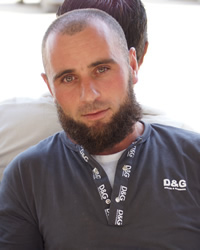Chechen in Austria

Photo Source:
CharlesFred - Flickr
Creative Commons
|
Send Joshua Project a map of this people group.
|
| People Name: | Chechen |
| Country: | Austria |
| 10/40 Window: | No |
| Population: | 26,000 |
| World Population: | 2,008,200 |
| Primary Language: | Chechen |
| Primary Religion: | Islam |
| Christian Adherents: | 0.00 % |
| Evangelicals: | 0.00 % |
| Scripture: | Complete Bible |
| Ministry Resources: | Yes |
| Jesus Film: | Yes |
| Audio Recordings: | Yes |
| People Cluster: | Caucasus |
| Affinity Bloc: | Eurasian Peoples |
| Progress Level: |
|
Introduction / History
Austria holds the fifth-largest Chechen population outside their homeland to the east in the Caucasus Mountains of Russia. This Northeast Caucasian people group has inhabited the Caucasus Mountain range dating back to 600 B.C. Because the region they inhabited is resource-rich and geographically advantageous for military action, the Chechens have been fighting outsiders since around 200 B.C.
Their Muslim ethnic identity was especially hardened when the Chechens allied with the other Muslim peoples of the Caucasus region to form a new republic called North Caucasia on the eleventh of May, 1918, which allied with Turkey just one month later. The Chechens were betrayed by the Bolsheviks after switching sides in the Russian Civil War and were soon subjected to genocide by the White Volunteer Army. When they appealed for help to the primarily Christian allied nations such as Great Britain, the British refused to intervene. The Chechens were freed from the Whites by the Bolshevik Red Army in early 1920, revolted against the antireligious Soviet government in 1927, and were eventually forced into submission by the Soviets in 1936. From 1937, the Soviets killed or deported all Chechens leaders which sparked another revolt. The cycle of Russian dominance and Chechen revolt that continues to this day.
Because of their long-standing struggle for independence with the Russians, Chechnya has become a breeding ground for terrorist groups against Russia and many other Western nations. Given this tradition of war and rebellion in the Chechen homeland, many have fled to other countries. Those who can, flee to European countries like Austria.
What Are Their Lives Like?
Virtually all Austrian Chechens are trilingual, fluent in Chechen and Russian and competent in German. The majority of Chechens in Austria reside in urban centers, with the rest working as farmers in rural areas. Their diet, attire, religion, expressive culture and social structure resembles that of their native Chechnya. There are communal areas known as "Little Chechnyas" wherever Chechens have settled. Austria is no exception.
Chechens are strongly patriarchal, to the point that if a father dies and is buried in a certain area, his surviving family will likely remain in that place forever unless they are forced out militarily. Chechen men are fully responsible for providing for the family unit while the women are responsible for all family matters. The women essentially are "owned" by the immediate head of the household, often her husband, father or brother.
What Are Their Beliefs?
Chechens can be devout Muslims, often for nationalistic purposes. Due to the Chechen peoples' warrior history and the way that the Muslim Turks often came to their aid militarily, the Chechen people are overwhelmingly Sunni Muslim, observing the Shafi rite.
Because they have historically fought against or have been refused aid from Christian and anti-religious nations, they are fiercely resistant to the gospel message. Sometimes called the "Mafia of Russia," these strongly Islamic people are known for fighting and military action. Christians Chechens are likely to face torture or death at the hands of the public. Because Chechens residing in Austria were deported there by the Soviets in the early twentieth century, these "Little Chechnyas" are also resistant to Christianity or any other religions.
What Are Their Needs?
The New Testament was translated into Chechen in 2007 and a complete Bible translation was not available until 2012. The JESUS Film and audio gospel recordings are also available in their heart language, but there is not yet a radio broadcast reaching out to them. There are no known churches or believers among this people group. They desperately need missionaries to go to them to live among them, earn the trust of the local leaders, and courageously share the gospel there. This is possible in Austria, a country with religious freedom.
Prayer Points
Ask God to call Christian workers who are trained in the Chechen language to take the gospel to the Chechens in Austria.
Ask God to soften the hearts of the Chechen people in Austria, especially the local elders, so they would be receptive to the gospel.
Pray for a justs and long-lasting peace between Chechnya and Russia.
Ask God to bring salvation to the Chechens and provide opportunity for strong local churches to be planted among them.?